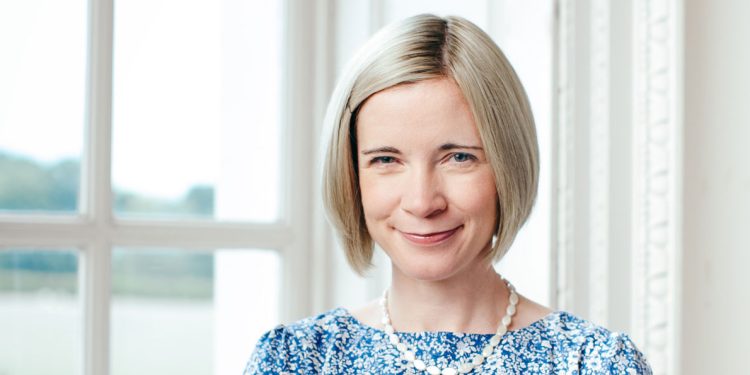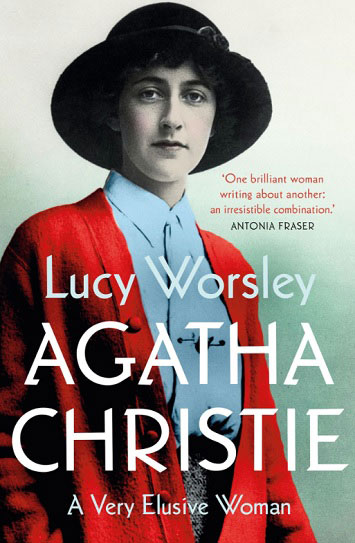Lucy Worsley In Conversation at Theakston’s Old Peculier Crime Festival

by Sarah Morgan
She’s the friendly face of history, a woman with more facts at her fingertips than you could shake a stick at. Lucy Worsley is rarely off our screens or the airwaves, whether she’s presenting documentaries or, in regards to her latest venture, hosting a Channel 5 quiz show.
So what was she doing in Harrogate at the Theakston’s Old Peculier Crime Writing Festival? The answer is simple – talking about the doyenne of the genre, Agatha Christie. And what Lucy Worsley doesn’t know about the great Dame isn’t worth knowing.
She’s written an extensive biography of Christie (and authored a well-received TV documentary about her), culled from months of research, much of it undertaken at Greenways, the writer’s former home in Devon, which is now a National Trust property. But, out of all the figures in history she could have chosen to write about, what was it that prompted Lucy to focus on her?
“My interest was prickled by the fact that she’s only been outsold by Shakespeare and God!” laughs the Oxford graduate, whose day job involves being the joint curator of the Historic Royal Palaces. “And she’s a woman! She’s part of the fabric of our lives and she achieved it in a world dominated by men.”
Lucy also reckons that the public and academia’s view of Christie has changed in recent years. She was always beloved by her readers, but literary professors had a nasty habit of looking down their noses at her.
“Research”
“Thirty years ago there was a snobbery about Agatha’s work,” she explains. “But if you study English Literature now, it’s likely to be on the syllabus because the canon of great literature is expanding to include other voices.”
Lucy Worsley’s research has led her to the conclusion that there were several key pointers in Christie’s life that helped form her future as a writer. The first was that her father was an ex-pat American, which gave her an outsider’s view of English society during the early part of the 20th century. When he lost the family fortune and then died while she was still young, Christie suffered nightmares in which her mother would turn into a terrifying figure.
“That’s important to her fiction because it often features a trusted figure who turns into someone capable of murder.”
And then, shortly after her marriage to her first husband, the Great War broke out. With her other half away serving with the military, Christie “volunteered as a nurse in Torquay. For the first time, she got paid, it was a proper job. She formed friendships, which gave her confidence and made her think she could be a professional person. But because nurses were looked down on by doctors, it gave her a dislike of authority.
“And which profession carried out the most murders in her books? Doctors!”
Lucy adds: “Nurses experienced the horrors of war, seeing what happened to young men’s bodies on the frontline, but were told not to talk about it at home for fear of upsetting people and damaging morale. That seems important in the idea of characters wearing ‘masks’ in her work – seemingly being one person, and then taking off the mask and revealing another. And she also learned a lot about poisons!”

“Matters of the heart”
Just as she reached the height of success, Christie, then a mother to daughter Rosalind, famously disappeared for 11 days in 1926, sparking a massive police hunt. She was, of course, eventually found in what is now Harrogate’s Old Swan Hotel – the very place where the crime festival has taken place for the past 20 years.
It’s now suspected that the author had a breakdown due to several devastating events, including discovering that her husband was leaving her for a younger woman. She may have been in what’s known as a fugue state, and certainly suffered the symptoms of depression.
Eventually, she sought help from a Harley Street psychiatrist, possibly William Brown, a shell shock specialist who Lucy thinks encouraged her to write down her experiences. Her prose may then have formed the basis of the books she wrote under the pseudonym Mary Westmacott.
Although it’s widely believed she never spoke about what happened, Christie gave a lengthy interview about what prompted her to disappear in 1928, which Lucy believes was her attempt to tell her side of the story as she faced losing custody of her daughter during her divorce proceedings.
Nevertheless, Christie was vilified in the press, with some claiming she either vanished as part of a publicity stunt or to frame her adulterous husband for murder.
“If you adopt either of those theories, and there are plenty that do, you miss out on the joy in how her treatment may have impacted on her work,” says Lucy. “Poirot certainly became more interested in matters of the heart and forensic details after 1926.”
“She toasted success with champagne”
Christie did marry again, to archaeologist Max Mallowan. He was 14 years her junior, and the author herself once famously quipped, “an archaeologist is the best husband any woman can have; the older she gets, the more interested he is in her.” They remained together until her death in 1976.
Almost 50 years on, Christie continues to be known as the Queen of Crime. But her work does pose problems for some modern-day readers.
“One of the things held against her today are a set of values held by the so-called Golden Age of Crime. But it’s difficult to tell what her attitudes were because she was writing for such a long period; there’s a sense of evolution. Amongst other Golden Age writers, she’s actually quite sensitive.”
She could also be a lot of fun, which is one of the things Lucy Worsley likes about Christie the most: “She had a great appetite for food! She toasted success not with champagne, but with cream!
“We tend to think of her now as a wrinkly old lady rather than young and sexy, but she was young and sexy once. And active too – roller-skating, surfing, driving too fast. You wouldn’t want to get into a car with Agatha!”
Maybe not, but thanks to Lucy Worsley bringing her back to life in her biography, it would certainly be wonderful to spend an hour or two in her company – perhaps over afternoon tea in Harrogate.
Frequently Asked Questions – Lucy Worsley on Agatha Christie








